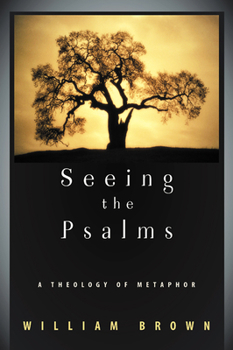Seeing the Psalms
William Brown introduces a new method of exegesis, particularly for biblical poetry, that attends to the metaphorical contours of the Psalms. His method as proposed and demonstrated in this book supplements traditional ways of interpreting the Psalms and results in a fresh understanding of their original context and contemporary significance.
Format:Paperback
Language:English
ISBN:0664225020
ISBN13:9780664225025
Release Date:January 2002
Publisher:Westminster John Knox Press
Length:256 Pages
Weight:1.01 lbs.
Dimensions:0.8" x 6.1" x 9.0"
Customer Reviews
1 rating
Stretching our theological understanding, Seeing in Psalmic Metaphors
Published by Thriftbooks.com User , 19 years ago
"Bless the Lord, O my soul. O lord my God, you are very great. You are clothed with honor and majesty, wrapped in light as with a garment. You stretch out the heavens like a tent." Psalm 104 The Psalter: The Book of hymns, Sefer Tehillim, or the Psalter, as it is sometimes called, is a collection of prayers and songs of praise composed throughout Israel's history, was regarded as a second Pentateuch, the richest in content and most revered of the three large Ketubim. Their virtual composer was David, who resembles Moses in office and authority. The Book of Psalms may be described as the hymn-book of the congregation of Israel during the era of the Second Temple, although some psalms in the collection do not share the main character to which this designation may apply. Recently, biblical scholars have modified the view that the Psalms were hymns sung in the Temple either by the Levites or by the congregation, since the participation of lay people in Temple liturgy was marginal. Psalms recitation as a sacrificial functions is not probable, due to their different themes. In spite of earlier accepted views that king David was expressing his own feelings and relating his personal experience, it is more probable that, in some instances, the 'I psalms' may have their individual significance. Generally, this personal pronoun implies reference to the 'congregation of Israel' or to a group or set of congregants at prayer, the righteous, the pious, the meek. Composition of the Psalter: Ten men are given a share in the compilation of the Psalter, but the chief editor was David. The two variant lists of the ten names are given as: Adam, Moses, Asaph, Heman, Abraham, Jeduthun, David, Solomon, while Korah's three sons counted as one, and Ezra. Ethan ha-Ezrahi is substituted sometimes for Abraham. The division into five books known to the Rabbis corresponded with that observed in contemporary editions, and Psalms order was identical with that of modern translations. The Masorah divides the book into nineteen 'sedarim,' the eleventh of these beginning with Ps. 78. Rabbi Joshua Levi, a Palestinian authority, canonizes only 147 psalms, and was reported to have desired to make alterations, and Moses has been credited with the authorship of eleven psalms, excluded from the Torah, since their composition was not in the prophetic spirit! The Coptic, Greek, Slavonic and Syriac Septuagint, all contain an extra psalm 151 by David, which has been always chanted on Easter Saturday in the Coptic Church, was found in a scroll of biblical psalms discovered in 1956 in the Dead Sea, Qumran Cave 11. Psalms Literary Form: In form the Psalms exhibit the charming beauty of Hebrew language and a wealth of poetical metaphor. The prevailing scheme is the couplet of two corresponding lines, that conveys the rhythm of thought, revealed in the variety of parallelism. The triplet and quatrain occur also, though not frequently. The refrain constitutes one of the salien





